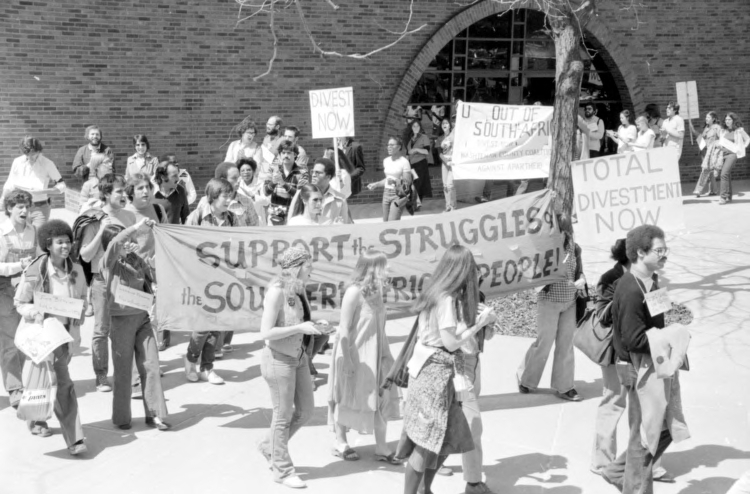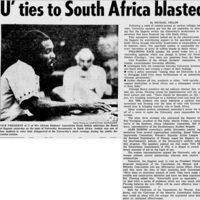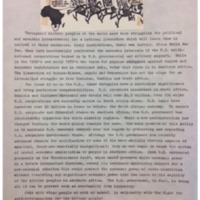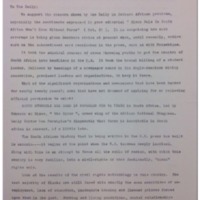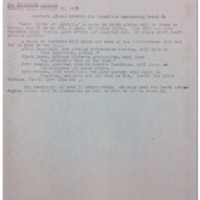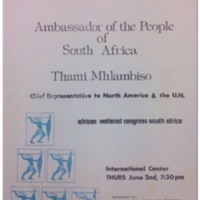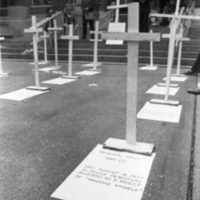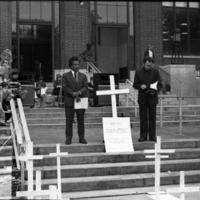II. Anti-Apartheid Momentum Comes to UM: 1977-1979
Two student organizations, the Southern African Liberation Committee (SALC) and the African Students' Association (ASA), launched the divestment campaign at the University of Michigan in the spring of 1977. That May, soon after the well-publicized anti-apartheid protests at Stanford University, representatives of SALC and the ASA spoke at a meeting of the UM Board of Regents. Joined by two other students, a Michigan Daily editor and a leader of the UM chapter of the Revolutionary Student Brigade, the group informed the Regents and administration officials that a movement demanding divestment from South Africa was rising on campuses across the nation. The ASA's statement called on UM to "disengage itself" from corporate investments that supported "an acknowleged inhuman government" and cut all academic ties to racially segregated institutions in South Africa. While none of the Regents responded, UM President Robben Fleming expressed his personal opposition to the policy of apartheid and endorsed further "discussion" of the issue of divestment. In fact, the debate and conflict between UM anti-apartheid activists and the Board of Regents that started in 1977 would continue for a decade.
Ansell Horn, a native South African who co-founded the Southern Africa Liberation Committee at UM in 1975, posits that "the anti-apartheid movement became a major issue at U-M because we [the coalition of student activists] made it one." SALC and its allies protested UM's investment policies, reached out to media outlets, brought in experts and liberation struggle leaders to educate the campus community, and even hosted a public debate with President Robben Fleming. As Horn explained in a 2015 interview, anti-apartheid groups sought to raise awareness among UM students and dispel the often "distorted and ignorant" messaging from mainstream U.S. reporting on South Africa. Through the work of these campus activists, events such as the 1976 Soweto massacre and the 1977 murder of resistance leader Steve Biko by South African police reached the consciousness of many UM community members. SALC also connected the UM movement to the national network of anti-apartheid groups, on other campuses and among civil rights and religious organizations.
The leaders of these early anti-apartheid groups at UM emphasized the inclusive principles and moral fervor that characterized the movement on campus. According to Ansell Horn of SALC, "the issue was political and moral principle, not race," which allowed for a high degree of cooperation among previously distinct protest movements. Josué Njock-Libii, the president of the African Students' Association when the divestment campaign began, noted the involvement of religious groups, fraternities and sororities, environmental activists, and organizations affiliated with communism and socialism, among others. Libii also identified a confluence of major activist traditions from which anti-apartheid activists drew influence and motivation, including the Black Action Movement at UM during the early 1970s, the Black Consciousness Movement in South Africa led by Steve Biko, the anti-Vietnam War movement, and the ongoing civil rights movement in the U.S.
In the fall of 1977, the ASA and SALC joined forces with several other organizations both on and off campus to form the Washtenaw County Coalition Against Apartheid (WCCAA), an umbrella organization that would coordinate the anti-apartheid movement at UM during the late 1970s and early 1980s. Bringing together students, faculty, and members of the surrounding Ann Arbor community, the WCCAA dedicated its mission to the anti-apartheid cause and opposed all forms of institutionalized social, political, and economic racism. The WCCAA's concerted attacks on UM investments in companies that conducted operations in South Africa brought the issue to the forefront of campus politics and forced the Board of Regents to take a stand.
Sources for this page:
The Michigan Daily, May 20, 1977.
Interview of Josué Njock Libii by Mario Goetz, April 15, 2015.
Interview of Ansell Horn by Mario Goetz, April 26, 2015.

